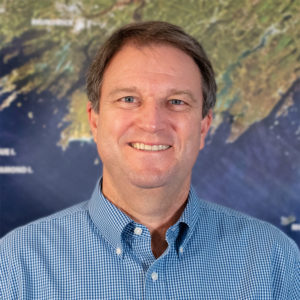My name is Tony Chatwin. I am the president of the Island Institute. For the reasons set forth below, I am offering this testimony on behalf of the Island Institute in opposition to the proposed waste discharge permit application for the American Aquafarms project.
The Island Institute is a 38-year-old nonprofit organization based in Rockland, working to sustain Maine’s island and coastal communities. Our work focuses on ensuring that Maine’s island and coastal communities have resilient economies, are equipped to adapt to climate change, and have leadership in place to navigate change.
The proposed project is an example of a type of change that islands and coastal communities must deal with. This application has more than 1,000 pages of technical information that require considerable effort, expertise, and resources that communities often do not have.
The proposed primary treatment system does not remove the nutrients and chemicals from the effluent flowing into Frenchman Bay…
I commend the town of Gouldsboro for taking the necessary steps to listen to its citizenry and engage professional capacity to review the American Aquafarms proposal. We encourage the applicant to work with the town to help defray the expenses incurred by the town as part of meaningfully participating in this and other proceedings related to this project.
I want to be clear that the Island Institute fully supports the development of sustainable economic activities that depend on and are compatible with healthy water quality in the Gulf of Maine. This includes the lobster fishery and aquaculture projects that reflect the interests of local communities and do not carry excessive risks of degrading Maine’s coastal waters.

In fact, we have worked to directly support dozens of aquaculture projects throughout the coast. From 2015 to 2019, our Aquaculture Business Development program supported 133 people in assessing their options in aquaculture and helped start or grow 33 new aquaculture businesses—many founded by fishermen to diversify their income.
According to the Department of Marine Resources website, in Frenchman Bay alone there are currently 17 limited purpose aquaculture licenses and five leased sites, with an additional four leases under review. These businesses focus on oysters, mussels, scallops, hard clams/quahog, and kelp.
These sustainable aquaculture businesses require good, clean water to be successful. These enterprises do not require additional inputs to ensure production. In fact, in many cases, these aquaculture projects improve local water quality.
As part of the proposed operation, the American Aquafarms proposal requires adding significant inputs—both feedstock and chemicals—into the pens to produce a marketable product. The proposed primary treatment system does not remove the nutrients and chemicals from the effluent flowing into Frenchman’s Bay, relying instead on dilution models.
The risk of environmental degradation that those inputs pose to the health of the bay, and to the existing sustainable aquaculture enterprises, is unacceptable. Therefore, we urge the DEP to deny the proposed waste discharge permit application for the American Aquafarms project.
Thank you for your consideration.




